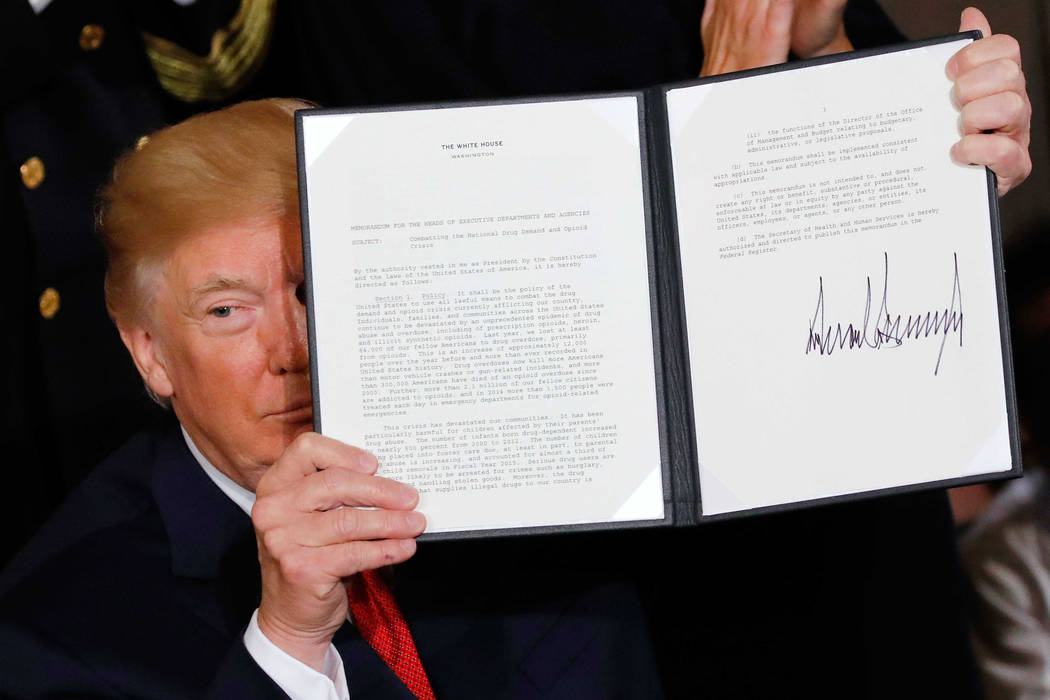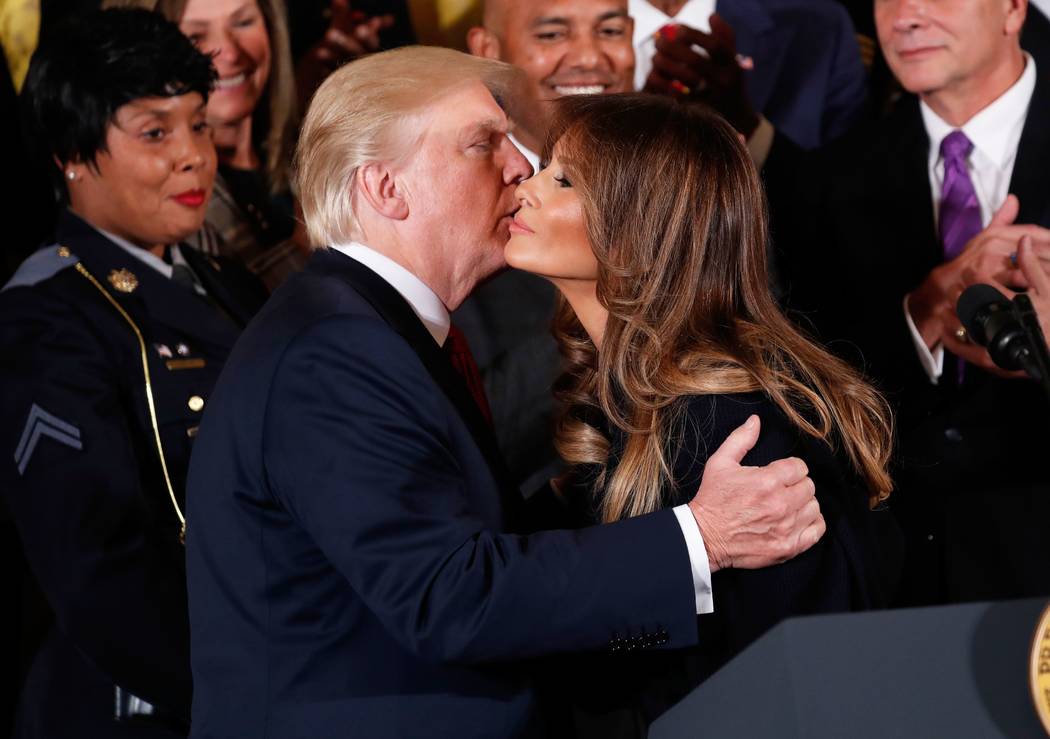Trump declares opioids a U.S. public health emergency
WASHINGTON — President Donald Trump declared the opioid epidemic a national public health emergency Thursday in a packed East Room ceremony that highlighted his caring side.
Trump talked about his brother Fred’s losing battle with alcohol – Fred Trump died at age 43 – as he offered, “Each of us is responsible to look out for our loved ones, our communities, our children, our neighbors, and our own health.
“Illegal drug use is not a victimless crime,” Trump declared. “There is nothing admirable, positive, or socially desirable about it.”
In March, Trump established the President’s Commission on Combating Drug Addiction and the Opioid Crisis. In July, the commission issued an urgent recommendation that he declare the opioid epidemic a national emergency, saying the crisis was causing some 142 overdose deaths daily — “equal to Sept. 11th every three weeks.”
Overdoses have accelerated since then to the point that a new White House fact sheet estimates that 175 Americans die from drug overdoses every day. “That’s seven lost lives per hour in our country,” said Trump.
Trump did not declare a national emergency. Instead he signed a renewable 90-day order that directed acting Secretary of Health and Human Services Eric Hargan to declare a nationwide public-health emergency with a goal of reducing overdose deaths.
The public-health emergency order came with no funding — which prompted criticism.
Vermont Sen. Bernie Sanders tweeted, “Trump is right that the opioid crisis is a national emergency. Unfortunately, his announcement today was nothing more than an empty promise.”
Instead, the White House supports an ad campaign designed to prevent people from trying illicit drugs, which also prompted criticism.
The Drug Policy Alliance, a nonprofit organization that opposes the war on drugs, slammed Trump for characterizing the crisis “as a ‘war’ and outlined his administration’s plans to ‘defeat’ it, including Reagan-era style ‘just say no’ prevention campaigns and restrictions on opioid prescribing.”
In addition, the administration will support research to develop “non-addictive” painkillers – a nod to the fact that some users became hooked on opioids after their doctors prescribed them. The White House also has supported education programs to prevent doctors from over-prescribing opioids and issued new rules for manufacturers.
Trump also spoke in favor of supplying first responders and police with “life-saving overdose medications.”
David Rausch, the police chief in Knoxville, Tennessee, later told reporters that all of his officers carry Narcan, a device that can prevent overdose deaths, which they use as often as five or six times a week. Emergency medical technicians also use Narcan to save lives.
During the 2016 campaign, Trump often raised the issue of opioid abuse, which he promised to make a priority.
First lady Melania Trump recently trekked to Huntington, West Virginia, to visit Lily’s Place, the nation’s first nonprofit recovery center for infants born to addicts and their families.
The first lady opened the ceremony with remarks about her commitment to fighting drug abuse. Behind the first couple stood first responders, law enforcement, adults in recovery and families that have struggled with addiction issues.
As he signed the declaration, Trump summoned New Jersey Gov. Chris Christie, who chaired the opioid crisis commission, to the front of the room. Later, the Republican governor applauded “an extraordinary beginning set of steps to dealing with this problem,” and told reporters that Trump’s interest in fighting addiction is “one of the things that I’m most proud” of about the president.
Before the first couple sat a number of White staffers, cabinet officials, members of Congress and six governors.
But there were two slots left empty — a confirmed Health and Human Services Secretary and a confirmed head of the Drug Enforcement Administration to carry out the plan.
Secretary of Health and Human Services Secretary Tom Price resigned in September in the wake of reports about his reliance on expensive charter plane travel.
Tom Marino, Trump’s nominee to head the Drug Enforcement Administration, pulled his name from consideration after news reports tied him to legislation that made it harder for federal law enforcement to go after pharmaceutical distributors that have flooded rural areas with opioids.
While Trump talked about legal consequences for illicit trade, his focus was on the need for Americans to care for each other. He praised foster parents who care for children born dependent on opioids and other drugs.
And he spoke in stark terms with a soft edge when he discussed “the need to confront reality, right smack in the face, that millions of our fellow citizens are already addicted. That’s the reality. We want them to get the help they need.”
Contact Debra J. Saunders at dsaunders@reviewjournal.com or 202-662-7391. Follow @DebraJSaunders on Twitter.
The opioid crisis
—In 2016, more than 11.5 million Americans ages 12 and older reported misuse of prescription
opioids in the past year, and nearly 950,000 Americans reported heroin use in the past year.
—In 2014, the number of babies born drug-dependent had increased by 500 percent since 2000,
and children being placed in foster care due in part to parental drug abuse is going up — now
it is almost a third of all child removals.
Source: The White House























